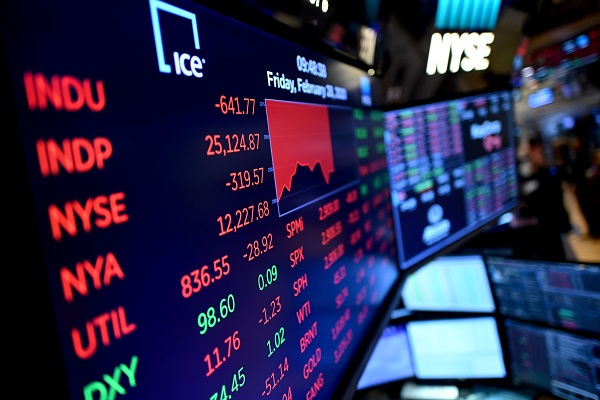Market snapshot: focus shifts back to earnings and data
Despite the threat of escalation in the Middle East conflict, it's the rush of company results both here and in the US that is grabbing the immediate attention of investors. Our head of markets assesses the situation as it stands.
17th October 2023 08:35
by Richard Hunter from interactive investor

Markets generally rose Monday, with investors keeping a watchful eye on developments in the Middle East, but at least temporarily choosing to focus on a strong start to the earnings season.
Around a tenth of the S&P500 are due to report results this week, and of the few which have so far stood up to the plate, the vast majority have beaten expectations on both earnings and revenues. Indeed, since the season began in earnest on Friday, estimates for earnings on the whole have been lifted to a likely annual increase of 2.2% from a previous 1.3%.
- Learn more: SIPP Portfolio Ideas | How SIPPs Work | Transfer a SIPP
In addition, outlook comments have largely been reassuring, leading to hopes that the final quarter of the year can eradicate some of the weakness seen in markets over what has been a testing summer period. Charles Schwab Corp (NYSE:SCHW) was the latest beneficiary, rising by almost 5% after beating earnings per share estimates, adding to the initial boost of stronger numbers from the likes of JPMorgan Chase & Co (NYSE:JPM), Wells Fargo & Co (NYSE:WFC) and UnitedHealth Group Inc (NYSE:UNH).
Bank of America Corp (NYSE:BAC), The Goldman Sachs Group Inc (NYSE:GS) and Johnson & Johnson (NYSE:JNJ) are features of a busy upcoming trading session, while the release of retail sales numbers will provide further colour on the actual behaviour, rather than sentiment, of the vitally important US consumer. It is expected that the data will have edged up slightly, although there will be a wary eye on the possible switch from goods and services purchasing coming from pandemic savings, to be replaced by more spending on credit.
Even so, the possibly transient return to a risk-on approach resulted in a positive session for the main indices, even if events in the Middle East threaten at any point to derail sentiment. The current hopes are that diplomatic efforts could contain the conflict to the region without escalation elsewhere, and as a result both oil and gold prices have given up some of their initial spikes as investors move into different asset classes. In the meantime, the main indices have added to their gains in the year to date, with the Nasdaq now ahead by 30%, the S&P500 by 14% and the Dow Jones by 2.5%.
Asian markets also took some solace from the cautious improvement in sentiment, although there remain regionally specific concerns. The property sector remains hamstrung by the possibility of default from the likes of developer Country Garden, while economic growth figures due for release tomorrow are expected to show a quarterly decline to under 5%, which would compare to 6.3% in the previous. As such, investor attitudes towards China remain in the balance, as any economic bounce from the previous reopening of the economy appears to have disappeared.
In the UK, wage inflation came in at 7.8% over the last quarter, outstripping inflation for the first time since during the pandemic. With job vacancies also beginning to decline, there are renewed hopes that the Bank of England will now not only be in a position to pause interest rate rises, but that the peak of the cycle has been reached.
The FTSE250 has tended to mirror the knife-edge on which the UK economy sits, with anaemic growth alongside a tightening and increasingly challenging broader environment, and is now down by more than 7% this year.
- Q3 results preview: profit expectations and an upgrade for UK stocks
- Is the UK stock market still worth investing in?
- Which taxes pose the greatest threat to your wealth?
The premier index remained near the flatline in opening exchanges, trying to establish an early positive trend.
A strategic overhaul at Rolls-Royce Holdings (LSE:RR.) which will result in the global loss of 2,500 jobs was well-received given savings which could amount to up to £200 million. The shares have had a stellar year so far, rising by more than 130%, as any number of factors have played into the company’s hands, not least of which has been the return to airline travel.
Elsewhere, there was some weakness in the housebuilding sector, partly driven by the more recent evidence of falling house prices and faltering demand. The FTSE100 is now ahead by 2.7% this year, and could yet have its defensive qualities tested once more as global geopolitical developments remain in the spotlight.
These articles are provided for information purposes only. Occasionally, an opinion about whether to buy or sell a specific investment may be provided by third parties. The content is not intended to be a personal recommendation to buy or sell any financial instrument or product, or to adopt any investment strategy as it is not provided based on an assessment of your investing knowledge and experience, your financial situation or your investment objectives. The value of your investments, and the income derived from them, may go down as well as up. You may not get back all the money that you invest. The investments referred to in this article may not be suitable for all investors, and if in doubt, an investor should seek advice from a qualified investment adviser.
Full performance can be found on the company or index summary page on the interactive investor website. Simply click on the company's or index name highlighted in the article.